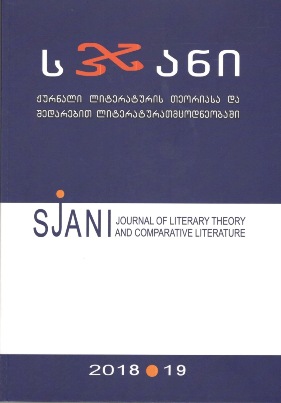‘one other living soul’: Encountering Strangers in Samuel Beckett’s
Dramatic Works
‘one other living soul’: Encountering Strangers in Samuel Beckett’s
Dramatic Works
Author(s): Andrew GoodspeedSubject(s): Language and Literature Studies
Published by: ლიტერატურის ინსტიტუტის გამომცემლობა
Keywords: samuel beketi; dramaturigia; ucxo; dapirispireba.
Summary/Abstract: Beckett’s primary dramatic focus is not upon encounteringstrangers. Beckett is much more readily identifiable as the creator of tightly woveninterpersonal dramas, or interior monologues expressed through dreams, groans, or hallucinations.Yet it may be profitable to examine those instances in which Beckett depicts theencounter with a stranger in his dramatic works, as these instances give indications of generaltrends in his drama. Notably, three points seem justifiable and notable. 1) It is remarkablehow comparatively rare strangers are in Beckett; he is very much a dramatist of theinterrelations of known individuals, or interior monologues. 2) It is notable also how manyof the characters in Beckett’s plays exist in ambiguous relations to one another. Many ofthe exclusions made above might well be contested with justice. Similarly, a number ofrelations examined herein may appear to readers to suggest that one or more players hasbeen falsely identified as a stranger. The potential validity of these objections demonstrateshow equivocal and enigmatic the relations are amongst many of Beckett’s characters. 3)It is striking how often strangers harm one another in Beckett’s writing. Whether it be Mr.Rooney potentially knocking a child off the train, the Glazier smashing Joseph the hatchetman unconscious, strangers beating Estragon in the night, the readiness of Clov to gaff ayoung boy (he appears ready, despite being stayed by Hamm), or the willingness of Bim,Bam, Bom and Bem to beat one another into weeping and confessions, it seems commonin Beckett’s drama that one should seek to minimize contacts with strangers, because theybring with them intrusion, potential peril, and physical harm. Strangers occasionally showmercy, as do Vladimir and Estragon to Pozzo and Lucky, A and B in Rough for TheatreII, or the reader in Ohio Impromptu. Yet in Beckett’s dramathe compassion of strangers isuncertain, and the menace they present is all too alarmingly consistent. It seems clear thatin Beckett’s world strangers rarely feel the ethical compulsion of Levinas to care for theother: ‘...since the Other looks at me, I am responsible for him, without even having takenon responsibilities in his regard; his responsibility is incumbent on me.’..
Journal: სჯანი
- Issue Year: 2018
- Issue No: 19
- Page Range: 252-263
- Page Count: 11
- Language: English

